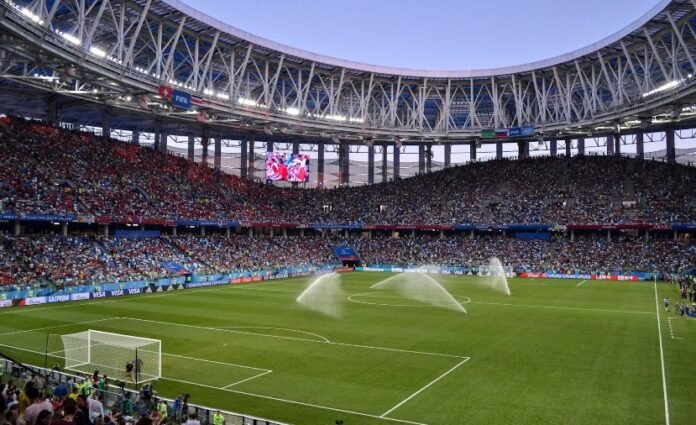The World Cup is the biggest sporting spectacle in the world. An average of 200 million people watch each World Cup match, a figure multiplied by 64 games makes the huge number of about 13 billion spectators (according to 2014 numbers). But not only that, as Professor Simon Shibli of Sheffield Hallam University explained to the BBC, “Everyone knows that the World Cup and, to a lesser extent, the Olympics, are the two biggest sporting events in terms of media interest and coverage.”
Everyone watches the World Cup, and not only because soccer is the most popular and played sport in the world, but because the cultural background of the World Cup is so strong that it influences a country’s economy and even – look at the example of Argentina ’78 – its political choices. However, music’s impact on top soccer competitions is often underestimated.
Surrounding the World Cup is a big music business capable of shifting interests and moving the most critical planetary stars.
Since 1962, FIFA has commissioned the production of an “official anthem” for the World Cup.
This year, for example, four official world cup anthems have been produced, including “Live It Up” by Diplo, Will Smith, and Nicky Jam and “Colors” by Maluma and Jason Derulo (the others are “Positivo” by J Balvin and “Komanda 2018” by Russian star Polina Gagarina).
Even before the World Cup, various platforms inherent to the soccer world often publish their own World Cup playlists and even SBO created a World Cup playlist to get you in the mood to start us breathing in the air of the big event. These songs will be listened to constantly throughout the World Cup as they accompany the tournament at every stage.
Scrolling through the names of the artists involved and those involved in recent editions-two things stand out:
– Since 1998, FIFA has commissioned more than one World Cup anthem, generally, at least one in English, one in Spanish, and one in the host country’s language.
– The main protagonists of the affair – Cuban Pitbull, Puerto Rican Lopez, Colombian Shakira – all belong, albeit with different nuances, to that ambiguous meta-musical vessel that goes by the name of Latin pop.
Argentina 1978
The first official World Cup anthem came in 1962 when Los Ramblers – a Chilean folk-rock collective still active today – were asked to compose a song to celebrate the arrival of the World Cup in Chile itself, “El Rock Del Mundial.” Local musicians were constantly called upon for several years to compose the Cup’s official anthem – and so it would be for the following years – with one notable exception.
That of 1978, when the Argentine World Cup organized by Videla’s dictatorship thought of having Ennio Morricone compose their anthem. Despite the enormous suspicion that competition only served the dictatorship as a giant social diversion, Morricone agreed and composed the first wordless world anthem, enlisting the help of the Orquesta Filarmonica de Buenos Aires. As a result, “Marcha del Mundial” is a theme that betrays a very Morricone-like approach to composition and, from a purely musical point of view, one of the best anthems.
France 1998
It was in 1998, however, that everything changed. FIFA meets Latin pop on its way for the first time, and the binomial between the World Cup host nation and the artist composing the anthem jumps. Many will recall that the anthem for France ’98 is Ricky Martin’s “La Copa de la Vida,” which would become one of the Puerto Rican singer’s biggest hits.
With “La Copa de la Vida” – or with Anastacia’s “Boom” or Pitbull’s “We Are One” in later editions – pop stars invaded FIFA, and the World Cup began to take on today’s media proportions.
South Africa 2010
Pixabay PHOTO CAPTION: Waka Waka by Shakira
It is never easy to disentangle the officialdom of anthems, anthems, or official World Cup songs. For example, 2010 was the year of Shakira’s “Waka Waka,” as well as Knaan’s “Wavin’Flag,” composed by David Guetta and Will.I.Am. However, a piece by R. Kelly was also released during the same year and for the same competition. It is not entirely clear how the famous R&B singer wrote a piece that no one remembers, on which the Soweto Spiritual Singers also collaborated.
Nevertheless, it is somewhat symbolic of the utterly disorganized way FIFA thinks about and carries out the musical promotion of its events, the potential of which is so enormous that pieces that would otherwise soon fade into oblivion become unforgettable.

